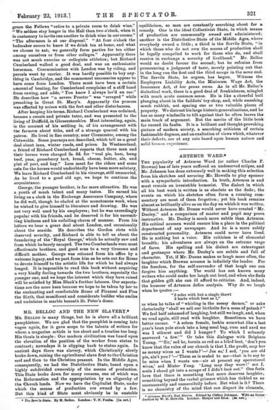MR. BELLOC AND THE NEW SLA VERY.* Mn. BELL00 is
many things, but he is above all a brilliant pamphleteer. We are glad that the pamphlet is coming into vogue again, for it gave scope to the talents of writers for whom a magazine article is too short and a treatise too long. His thesis is simple : Our modern civilization was based upon the elevation of the position of the worker from status to contract; nowadays it is slipping back to status again. In ancient days there was slavery, which Christianity slowly broke down, raising the agricultural slave first to the Christian serf and then to the Christian peasant. In the Middle Ages, consequently, we had the Distributive State, based upon a highly subdivided ownership of the means of production. This State broke down for many reasons, one of which was the Reformation and the appropriation by an oligarchy of the Church lands. Now we have the Capitalist State, under which the means of production are owned by a few. But this kind of State must obviously be in unstable
• The Sers:le State. By H. Belloc. London: T. N. Emits. [Ia net.] equilibrium, so men are constantly searching about for a remedy. One is the ideal Collectivist State, in which means of production are communally owned and administered ; another is the Distributive State of the Middle Ages, where everybody owned a little ; a third is the Servile State, " in which those who do not own the means of production shall be legally compelled to work for those who do, and shall receive in exchange a security of livelihood." Mr. Belloc would no doubt favour the second ; but he refrains from pronouncing a judgment of taste, merely pointing out that in the long run the first and the third merge in the same end. The Servile State, he argues, has begun. Witness the Employers Liability Acts, the Minimum Wage Act, the Insurance Act, et hoc genus omne. As in all Mr. Helloes dialectical work, there is a good deal of freakishness, mingled with much acute common sense. He is like a cheerful bull plunging about in the faddists' toy-shop, and, while smashing much rubbish, not sparing one or two valuable pieces of property. We distrust his large historic generalizations, and ho has so many mindmills to tilt against that he often leaves the main track of argument. But the merits of the little book far exceed its faults. It is a brilliant and thought-provoking picture of modern society, a searching criticism of certain fashionable dogmas, and an exaltation of views which, whatever their defects, are at any rate based upon human nature and solid Inman experience.














































 Previous page
Previous page